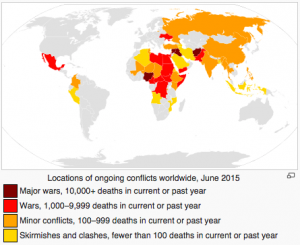Is the U.S. backed Japanese Self Defense Force massively changing their interpretation of pacifism? If so, why now? This strategic military realignment is coming on the heals of recent N. Korean provocations (as part of a continued cycle), in addition to unprecedented long range Chinese naval expeditions, which brought ships as close as 12nm off of the U.S. coast of Alaska while Pres. Obama was visiting. Not to mention (ok, I’m mentioning) Russian advances in Syria and Ukraine, Syrian refugees heading to Europe and the U.S., a Turkish conflict with PKK separatists in Northern Iraq,tensions increasing between Yemen and Saudi Arabia , all while international financial structures buckle under impending global debt crisis.
What can we do about all this?
1.Seek out the relationships and resources that will promote resiliency in your family and local community. For some this may be developing land, or buying tools of production, or even keeping some heirloom seeds, bitcoin or even silver around. Find out if your community has a time-banking organization. If it doesn’t, start one. Build or volunteer at a community garden, learn about plants/permaculture, and water collection. This is the knowledge we should be passing to each other in our interactions.
2. Always have an insurance plan for a market collapse. Invest in things people can’t live without (food systems, energy, essential services, water, hard assets, land, emergency supplies that persist).
3. Learn a trade or a skill-set that will allow you to produce value for yourself and those around you. What’s value? Well, that’s subjective. At a minimum there is farming/food production, tool making, clothing/footwear, renewable energies, permaculture, efficient housing… a realm of engineering, DIY, and creative possibilities!
4. Get connected with a network that will push you to learn, lead, and discover new ways to cooperate while protecting natural capital.
5. Try to spend your money and resources with intention. Contribute to your local economy and help maximize the value within a community you support. Shop at non-retail outlets, and independently owned businesses. Bank with a community bank, rather than an international bank.
Sources:


